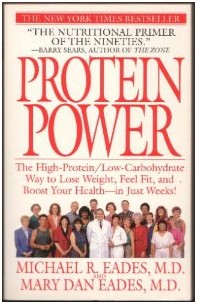What is Protein Power Diet?
The Protein Power Diet author says if you reduce
carbohydrate intake and increasing protein, then your weight will decrease and
become more healthy. But would you experience? Find out what the opinion of
most nutritionists.
The Protein Power diet was first introduced in 1996 by
Michael Eades, MD, and Mary Eades, MD, both of which are family practice
physicians. Their book, Protein Power, continues to be popular.
"The Protein Power diet is a diet that is high in
protein, low in carbohydrates. Diet is based on the approximately 30 to 60
grams of carbohydrates and plenty of lean protein," says Molly Kimball,
RD, a dietitian sport at Ochsner Health System's Elmwood Fitness Center, New
Orleans.
How Does Protein Power Diet?
The theory behind the Protein Power diet is based on the
primacy of the lower levels of insulin your body. Insulin is a hormone in your
body that regulates the metabolism of carbohydrates, or parse.
High insulin levels were not good. Several aspects of high insulin levels are:
- The conversion of fat into body fat intake.
- Increase the level of cholesterol.
- Increase your fluid retention by the kidneys.
The theory is that if you keep your carbohydrate intake to
remain low and dependent on protein and some fats in your diet, then your
insulin levels will be lower.
The Protein Power diet authors say that lower insulin levels
and fewer carbohydrates will lead to weight loss.
Protein Power Diet: Sample Menu
Foods recommended in the Protein Power diet include beef,
pork, wild game, and eggs. Forbidden foods such as cereals, breads, pasta,
refined sugar, and fruit in large portions.
Here is a sample menu which has about 1,600 heat, of which 25 percent come from protein, 50 percent from fat, and only 25 percent from carbohydrates:
- Breakfast: An egg boiled, bread with butter and an ounce of breakfast sausage, and coffee or tea
- Lunch: Three ounces of tuna and half a boiled egg, seasoned with mustard and low-fat mayonnaise, a bit of pita bread, lettuce, tomato, bean sprouts, pickles, olives, green onion, and sunflower seeds.
- Dinner: Four ounces of grilled salmon with a cup of zucchini and one-half tablespoon butter, a mixed green salad with an oil and vinegar dressing, and four ounces of white wine.
- Snack: Snack-typical snacks include two ounces Gouda cheese and an orange.
Protein Power Diet: Pros and Cons
"In addition to reducing weight and reduce
cardiovascular risk factors, the benefits of diets high in protein, low in carbohydrates,
among other less hungry, which leads to a reduced calorie intake," says
dietitian Bonnie J. Brehm, PhD, professor in the college of nursing at the
University of Cincinnati, Ohio. "This diet also helps to maintain lean
body mass - dieter can still retain muscle while reducing fat."
On the negative side, Brehm said, "restriction of
carbohydrate intake may lead to a lack of fiber, vitamins, and minerals due to
decreased intake of grains, fruits, vegetables, and dairy groups. Addition, a
high protein intake may lead to stress on the kidneys . "
Some other concerns regarding the Protein Power diet,
namely:
- Lack of vitamin D and calcium intake may contribute to osteoporosis.
- Allowing the saturated fats in the diet can contribute to heart disease.
- For many people, by eliminating carbohydrates such as fruit, candy, and baked products may make it difficult diet to follow.
Protein Power Diet: Short-Term Effects and Long-Term
There are some good things, useful in the diet. This diet is
not too extreme.
Eating lean protein, allowing some of the fat, and eliminate
refined sugar it all is a good strategy. "But for the long term, I'm not
sure you want to volunteer myself for not getting the benefits of whole grains,
fruits, and vegetables," said Kimball.
Brehm said: "For too long, a protein in the diet that
increases medium scale and to limit carbohydrates and fats, especially
saturated fats, will give a benefit."

